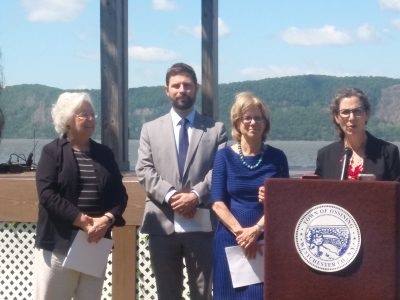Mayer Receives Support on Quest to End Digital Divide for Students With E-LEARN Bill
By Samuel Rowland

The Ossining Community Equity Task Force and various local and state officials threw its support last week behind the E-Let’s Expand Access to Remote Learning Now (E-LEARN) Act.
The proposed legislation, which was introduced by state Sen. Shelley Mayer (D-Yonkers) last Nov. 24, aims to create an E-LEARN Fund to provide free broadband internet access for every student in the state. The initiative would be funded by a quarterly tax on the intrastate revenues of internet service providers operating in New York.
“We used to provide a blackboard chalk in school as part of the essentials. Now the essentials are broadband and a tablet or some other instrument,” said Mayer, chair of the Senate’s Education Committee, at a May 27 press conference at Louis Engel Waterfront Park in Ossining.
The bill proposed that every student will have free 24-hour broadband access wherever they live at 25 megabits per second, which is the quality standard for broadband.
Access to broadband for families in lower income areas and communities of color has been lagging for years, but the digital divide became glaring after the need to switch to remote learning last March because of the pandemic.
New York’s budget for the current fiscal year includes a program, found in Bill S2506-C, Section 117(3), requiring all broadband providers operating in the state provide $15-per-month service plans to low-income families who qualify for certain government benefits. The plans would have to provide the 25-megabits-per second download speed outlined in Mayer’s bill.
State Sen. Elijah Reichlin-Melnick (D-Nyack) and Assemblywoman Sandy Galef (D-Ossining) also spoke at the event. Reichlin-Melnick is one of the Senate bill’s co-sponsors while Galef is a co-sponsor of the version in the Assembly.
“This was one of the very first bills that I co-sponsored when I became a member of the Senate in January,” Reichlin-Melnick said. “In 2018, a study found that over 15 percent of students in the U.S. had no access to broadband at home and over 30 percent of children of color have no access to broadband at home. We can’t accept that as the status quo.”
Reichlin-Melnick noted his own experience with the digital divide before the pandemic. His first job was as a teacher at an elementary school in a district comprised predominantly of students of color. Many families at the time were still struggling to obtain dial-up internet service, he said.
Community leaders recounted the challenges they saw children and families facing during the past year. Ossining Councilwoman Jackie Shaw, a task force member and Executive Director of the IFCA Housing Network, said immediate assistance is required.
“So, we have people choosing between rent and prescriptions and things like that. So broadband access and paying for that is not high on their list. But of course, they want their children educated,” Shaw said. “And we have a lot of kids in shelters who had a tablet or…phone but had no internet access. They were shut out of the educational system for long periods of time.”
On Mar. 2, the Senate bill was approved by the Education Committee and is now being debated in the Finance Committee. The Assembly bill was introduced on Feb. 11 and is still being debated in its Education Committee.
“The digital divide between our students became very evident during the COVID pandemic,” said Sandy McAllister, co-chair of the Ossining Community Equity Task Force and a member of the Ossining NAACP. “We wanted to find a way…of bringing forth this bill that we fully support. And we hope that everyone else will support us as we continue to strive to reduce the division.”
The Ossining Community Equity Task Force is a coalition of local stakeholder groups serving in an advisory role on town policy aimed at addressing systemic racism and other forms of systemic discrimination. The task force was formed after a suspected act of hate crime vandalism in Louis Engel Waterfront Park in 2019 shocked the community. Its relevance and profile increased in the wake of the murder of George Floyd last year.

Examiner Media – Keeping you informed with professionally-reported local news, features, and sports coverage.
